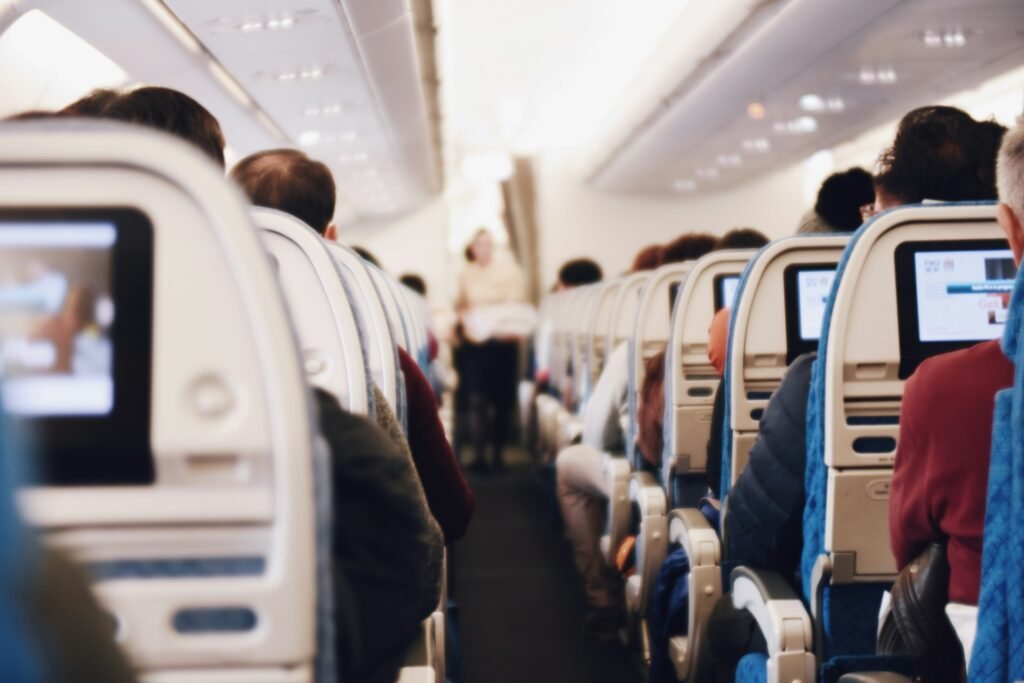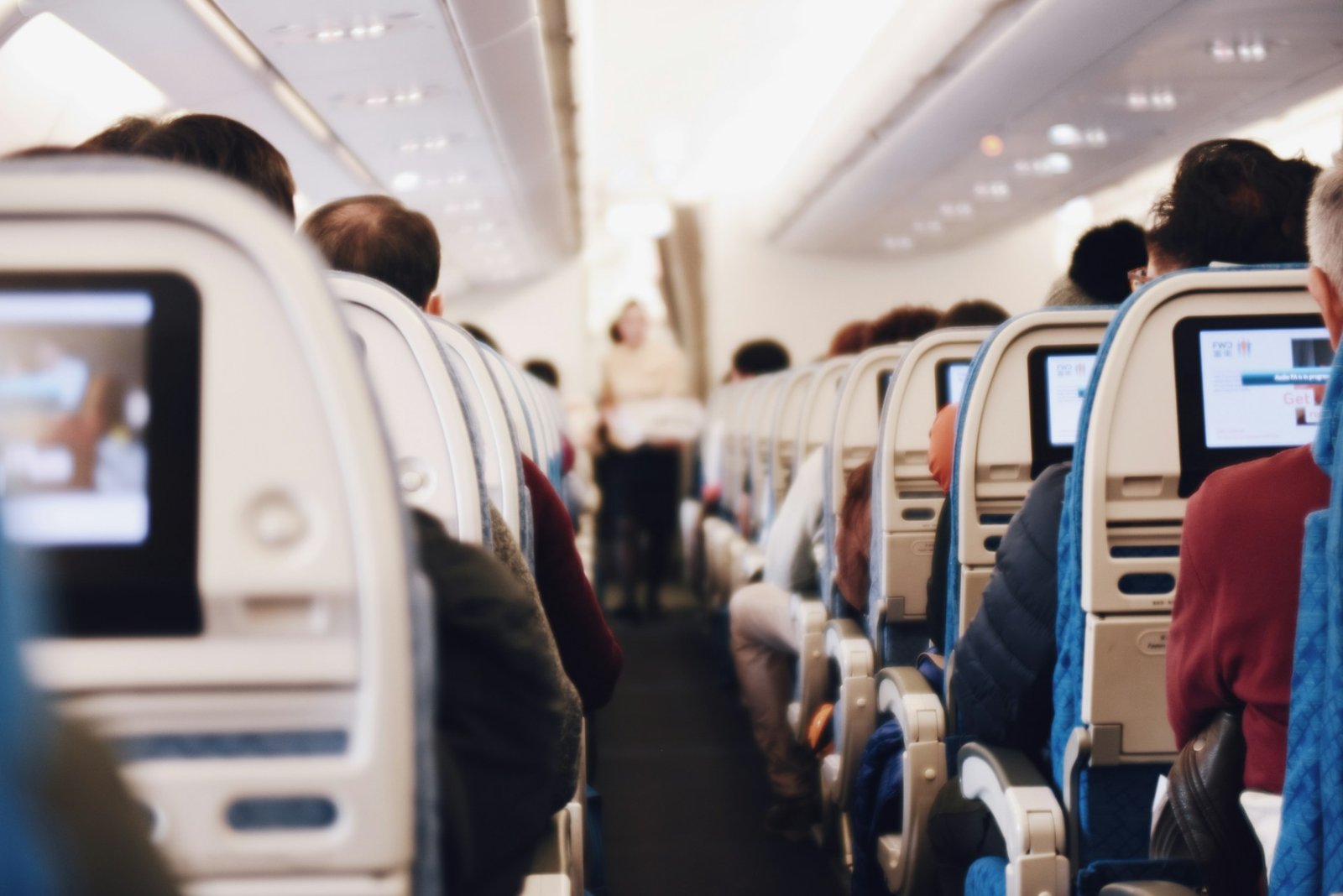Ever looked around on a flight and noticed empty seats? Or wondered how airlines fill every single plane? You’re not alone. The world of unsold flight tickets is a fascinating intersection of economics, travel trends, and airline strategy. But what does “unsold flight tickets” actually mean? And more importantly, how does it impact you, the traveler?
The mystery of empty seats on flights can be perplexing. In an age of packed planes and rising travel demand, it might seem counterintuitive that airlines still grapple with flight tickets unsold. Are these just lost opportunities? Or is there more to the story?

Photo by Suhyeon Choi on Unsplash
This comprehensive guide will demystify the world of unsold airline tickets, revealing the hidden dynamics of flight pricing, airline revenue management, and the surprising ways airlines attempt to fill those empty airplane seats. We’ll explore the reasons behind flight ticket unsold status, the strategies airlines employ to minimize them, and even how savvy travelers can potentially benefit from this complex system. Prepare to understand the meaning of unsold flight tickets like never before.
Defining Unsold Flight Tickets: More Than Just Empty Seats
At its most basic, unsold flight tickets refer to the seats on a scheduled flight that remain unpurchased by the time the aircraft doors close for departure. Think of it simply:
- Seats that are part of an airline’s flight inventory for a specific route and date.
- These seats were available for sale at various price points leading up to the flight.
- Despite marketing efforts and pricing strategies, these seats remained vacant on the actual flight.
Essentially, unsold flight tickets represent the gap between an airline’s flight capacity and the actual demand realized for a particular flight. While airlines strive for 100% seat occupancy, achieving this perfectly is a near-impossible feat in the dynamic world of air travel. These empty seats on flights are a tangible outcome of the complex interplay of factors influencing airline bookings.
Why Flights Have Unsold Tickets: The Reasons Behind Empty Seats
Understanding why flights have unsold tickets requires delving into the intricacies of airline operations and market dynamics. It’s not simply a matter of low demand overall; several key factors contribute to this phenomenon:
Demand Fluctuations and Seasonality: The Peaks and Valleys of Travel
Travel demand is far from constant. It ebbs and flows based on various cyclical and seasonal patterns:
- Peak vs. Off-Peak Seasons: Travel demand dramatically increases during peak seasons like summer holidays, school breaks, and major holidays (Christmas, Thanksgiving, etc.). Conversely, off-peak seasons (e.g., shoulder seasons, mid-week in non-holiday periods) experience lower demand, often leading to more unsold airline tickets.
- Weekdays vs. Weekends: Business travel often peaks on weekdays, while leisure travel is concentrated on weekends and around public holidays. Mid-week flights, particularly on less popular routes, may face challenges in filling seats.
- Special Events and Local Factors: Major events like festivals, conferences, or sporting events can create surges in demand for specific destinations at particular times. Outside of these event periods, demand might be lower, resulting in potential flight ticket unsold scenarios.
These demand fluctuations are a fundamental aspect of the travel industry, making it challenging for airlines to perfectly predict and match capacity with actual bookings on every flight.
Advance Booking Patterns: Predicting the Traveler’s Mind
Airlines must anticipate booking patterns far in advance to set prices and manage seat inventory. However, traveler booking behavior is complex and unpredictable:
- Early Bird Bookings vs. Last-Minute Bookings: Some travelers book flights months in advance to secure the best prices or preferred seats, while others are last-minute bookers driven by spontaneity or urgent travel needs. Airlines try to cater to both groups, but forecasting the exact ratio is difficult.
- Forecasting Challenges: Predicting future demand with pinpoint accuracy is virtually impossible. Economic conditions, unforeseen events (weather, pandemics, etc.), and competitor actions all influence booking patterns, leading to potential flight ticket unsold situations when forecasts miss the mark.
- Balancing Advance Sales and Last-Minute Availability: Airlines aim to sell a significant portion of seats in advance to ensure revenue predictability. However, they also hold back some seats, hoping to sell them at higher prices closer to departure to capture last-minute demand. If last-minute demand is weaker than anticipated, these seats may remain unsold.
Pricing Strategies and Market Segmentation: The Art of Revenue Optimization
Airlines employ sophisticated pricing strategies to maximize revenue, but these strategies can also contribute to unsold flight tickets if not perfectly calibrated:
- Different Fare Classes: Airlines offer various fare classes (e.g., Economy Basic, Economy Flexible, Business, First Class), each with different prices and conditions (baggage allowance, change flexibility, etc.). This market segmentation aims to capture different customer segments willing to pay varying prices. If demand for higher fare classes is lower than expected, those seats might go unsold.
- Yield Management and Dynamic Pricing: Airlines use complex algorithms to dynamically adjust ticket prices based on real-time demand, booking pace, and competitor pricing. While designed to optimize revenue, overly aggressive pricing or inaccurate demand predictions can sometimes lead to flight tickets unsold if prices are too high for the prevailing demand.
- Balancing Price and Occupancy: Airlines face a constant trade-off between price and occupancy. Lowering prices can stimulate demand and fill more seats, but it also reduces revenue per seat. Setting the optimal price point to maximize overall revenue while minimizing unsold seats is a delicate balancing act.
Unexpected Events and Disruptions: Factors Beyond Control
Unforeseen events can also contribute to unsold flight tickets, although often indirectly:
- Minor Operational Disruptions: Small delays or minor schedule changes, while hopefully minimized, can sometimes cause a few passengers to miss connections or rebook, leading to a few empty seats that were originally booked. (Major disruptions leading to cancellations are a different issue entirely).
- No-Shows (to a Limited Extent): While overbooking is designed to compensate for anticipated no-shows, if no-show rates are unexpectedly low on a particular flight, it could result in a very small number of truly unsold tickets even on an otherwise full flight. However, overbooking strategies usually manage this factor quite effectively.
The Impact of Unsold Flight Tickets: Consequences for Airlines & Passengers
Unsold flight tickets have significant implications for both airlines and passengers, although the nature of the impact differs:
Impact on Airlines: Revenue, Profitability, and Efficiency
For airlines, unsold flight tickets directly translate to lost revenue and impact profitability:
- Lost Revenue per Empty Seat: Every unsold seat represents potential revenue forgone. Airlines operate on thin margins, and even a few empty seats per flight can significantly erode profitability, especially on routes with high operating costs.
- Operating Costs Remain: Regardless of seat occupancy, airlines incur substantial fixed costs for each flight, including fuel, crew salaries, airport fees, and aircraft maintenance. Unsold flight tickets mean these costs are spread over fewer paying passengers, reducing efficiency and profit per flight.
- Yield Management Challenges: High numbers of unsold flight tickets can indicate inefficiencies in an airline’s yield management strategies – perhaps pricing was too high, capacity was overestimated, or marketing efforts were insufficient. Airlines constantly analyze unsold ticket data to refine their forecasting and pricing models.
Potential Passenger Benefits (and Drawbacks): Opportunities and Considerations
For passengers, the existence of unsold flight tickets presents a mixed bag of potential benefits and drawbacks:
- Potential for Last-Minute Deals (Opportunity): Airlines are often keen to fill as many empty seats as possible, even at discounted prices, rather than fly with them vacant. This can create opportunities for last-minute travelers to snag cheap flight tickets unsold closer to departure if demand hasn’t materialized as expected. However, these deals are not guaranteed and depend on the specific route and flight.
- Overbooking Risks (Drawback): To mitigate the risk of unsold seats due to no-shows, airlines often overbook flights – selling more tickets than available seats. While effective in maximizing occupancy on average, overbooking can sometimes lead to denied boarding for some passengers if more people show up than anticipated. This is a direct consequence of the airline’s attempt to manage the unsold ticket problem.
- Potentially More Space and Comfort (Benefit – Sometimes): On flights with a noticeable number of unsold flight tickets, passengers who did purchase tickets might enjoy the benefit of more personal space, especially if they can spread out across empty seats (depending on cabin configuration and airline policy). However, this is not a guaranteed benefit and depends entirely on the flight’s actual load factor.
Airline Strategies to Minimize Unsold Flight Tickets: Filling Empty Seats
Airlines employ a range of strategies to actively minimize the number of unsold flight tickets and maximize seat occupancy:
Dynamic Pricing and Fare Adjustments: Reacting to Real-Time Demand
Dynamic pricing is a cornerstone of airline revenue management:
- Lowering Prices Closer to Departure: If a flight is approaching departure with a significant number of unsold tickets, airlines often strategically lower prices to stimulate last-minute demand and fill those empty seats. This is why you might see discounted flight tickets appearing closer to the travel date.
- Demand-Based Pricing Algorithms: Sophisticated algorithms continuously monitor booking patterns and adjust fares in real-time, aiming to optimize prices based on predicted demand levels. The goal is to price tickets competitively while maximizing revenue and minimizing unsold inventory.
Promotions and Discounts: Incentivizing Bookings
Airlines use various promotional tactics to boost bookings and reduce flight tickets unsold:
- Flash Sales and Limited-Time Offers: Airlines frequently launch flash sales with deeply discounted fares for specific routes and travel periods to create urgency and encourage immediate bookings, especially for flights with lower projected occupancy.
- Targeted Offers and Email Marketing: Airlines use customer data to target specific segments with personalized offers and promotions, aiming to stimulate demand on flights that might otherwise have unsold tickets.
- Loyalty Programs and Rewards: Frequent flyer programs incentivize repeat business and can be used to fill empty seats by offering discounted award tickets or upgrade opportunities.
Partnerships and Bundling: Expanding Reach and Appeal
Collaboration can help airlines reach new customer segments and fill empty seats:
- Package Deals with Hotels and Car Rentals: Bundling flights with hotels, car rentals, or tours can create more attractive travel packages, increasing the overall appeal and potentially filling seats that might otherwise remain unsold, particularly on leisure routes.
- Partnerships with Tour Operators and Travel Agencies: Airlines collaborate with tour operators and travel agencies to sell blocks of seats at negotiated rates, providing a guaranteed level of occupancy and reducing the risk of unsold flight tickets.
Overbooking: A Controversial Strategy to Manage No-Shows
Overbooking is a deliberate strategy to minimize revenue loss from anticipated no-shows, but it’s a double-edged sword:
- Compensating for Anticipated No-Shows: Airlines know that a certain percentage of booked passengers will inevitably not show up for their flights (due to missed connections, changed plans, etc.). To compensate for this expected “wastage,” they intentionally sell slightly more tickets than available seats.
- Managing Risk and Customer Impact: While overbooking is statistically effective in minimizing unsold seats over the long run, it carries the risk of denied boarding if more passengers show up than predicted. Airlines have procedures to handle denied boarding situations, including compensation and rebooking, but it can still lead to customer dissatisfaction.
Can You Benefit from Unsold Flight Tickets? Tips for Finding Deals
While you can’t directly “buy” unsold flight tickets in a separate category, you can potentially benefit from the strategies airlines use to fill them:
- Flexibility is Key: Being flexible with your travel dates and times increases your chances of finding discounted fares aimed at filling empty seats. Mid-week flights or flights during off-peak seasons are more likely to have better deals.
- Last-Minute Deal Websites and Airline Websites: Keep an eye on last-minute travel deal websites and the “deals” or “promotions” sections of airline websites, especially closer to your desired travel dates. Airlines often release discounted fares to fill remaining seats as departure approaches. Search for phrases like “cheap flight tickets unsold” but always book from reputable sources.
- Airline Newsletters and Social Media: Subscribe to airline newsletters and follow them on social media to be alerted to flash sales and promotional offers, which are often designed to quickly fill empty seats on specific flights.
- Be Aware of Risks and Limitations: Last-minute deals are not always available, and availability can be limited. You’ll also likely have less choice in terms of flight times, seat selection, and sometimes stricter ticket conditions.
Conclusion: The Dynamic World of Flight Ticket Pricing
The meaning of unsold flight tickets is multifaceted. They are not simply failures but rather a natural outcome of the complex dynamics of airline operations, demand forecasting, and revenue management. While empty seats on flights represent lost revenue for airlines, the strategies employed to minimize them can sometimes create opportunities for savvy travelers to find cheap flight tickets. Understanding the concept of unsold airline tickets provides valuable insight into the inner workings of the airline industry and empowers you to navigate the world of flight bookings with greater awareness and potentially, to your financial advantage. The next time you see empty seats on your flight, you’ll know it’s part of a much larger, intricate system designed to keep the world connected, one flight at a time.







